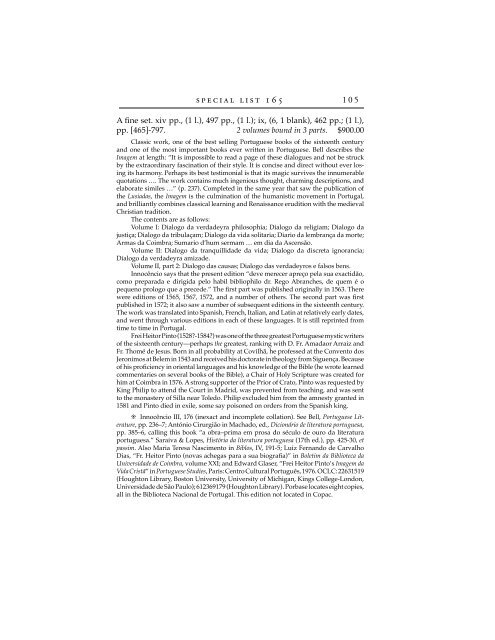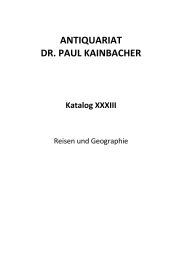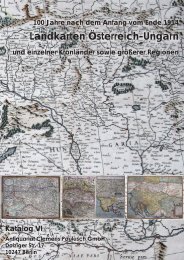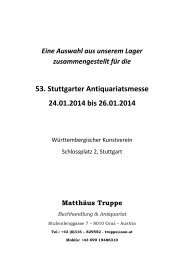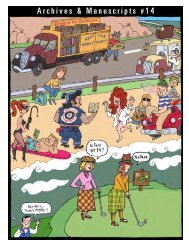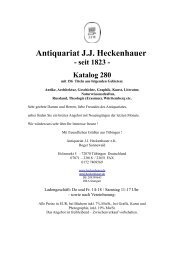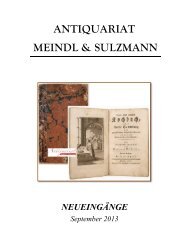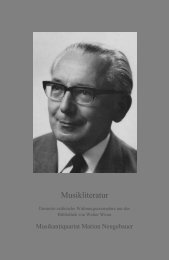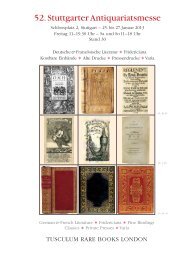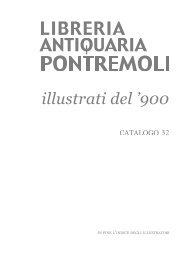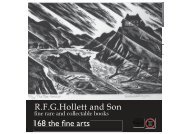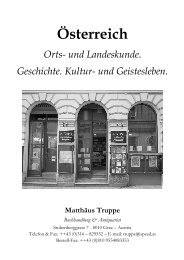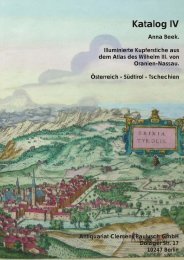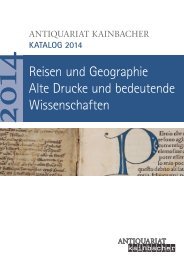Recent Acquisitions - Richard C. Ramer Old & Rare Books
Recent Acquisitions - Richard C. Ramer Old & Rare Books
Recent Acquisitions - Richard C. Ramer Old & Rare Books
You also want an ePaper? Increase the reach of your titles
YUMPU automatically turns print PDFs into web optimized ePapers that Google loves.
special list 165 105<br />
A fine set. xiv pp., (1 l.), 497 pp., (1 l.); ix, (6, 1 blank), 462 pp.; (1 l.),<br />
pp. [465]-797. 2 volumes bound in 3 parts. $900.00<br />
Classic work, one of the best selling Portuguese books of the sixteenth century<br />
and one of the most important books ever written in Portuguese. Bell describes the<br />
Imagem at length: “It is impossible to read a page of these dialogues and not be struck<br />
by the extraordinary fascination of their style. It is concise and direct without ever losing<br />
its harmony. Perhaps its best testimonial is that its magic survives the innumerable<br />
quotations …. The work contains much ingenious thought, charming descriptions, and<br />
elaborate similes …” (p. 237). Completed in the same year that saw the publication of<br />
the Lusiadas, the Imagem is the culmination of the humanistic movement in Portugal,<br />
and brilliantly combines classical learning and Renaissance erudition with the medieval<br />
Christian tradition.<br />
The contents are as follows:<br />
Volume I: Dialogo da verdadeyra philosophia; Dialogo da religiam; Dialogo da<br />
justiça; Dialogo da tribulaçam; Dialogo da vida solitaria; Diario da lembrança da morte;<br />
Armas da Coimbra; Sumario d’hum sermam … em dia da Ascensão.<br />
Volume II: Dialogo da tranquillidade da vida; Dialogo da discreta ignorancia;<br />
Dialogo da verdadeyra amizade.<br />
Volume II, part 2: Dialogo das causas; Dialogo das verdadeyros e falsos bens.<br />
Innocêncio says that the present edition “deve merecer apreço pela sua exactidão,<br />
como preparada e dirigida pelo habil bibliophilo dr. Rego Abranches, de quem é o<br />
pequeno prologo que a precede.” The first part was published originally in 1563. There<br />
were editions of 1565, 1567, 1572, and a number of others. The second part was first<br />
published in 1572; it also saw a number of subsequent editions in the sixteenth century.<br />
The work was translated into Spanish, French, Italian, and Latin at relatively early dates,<br />
and went through various editions in each of these languages. It is still reprinted from<br />
time to time in Portugal.<br />
Frei Heitor Pinto (1528?-1584?) was one of the three greatest Portuguese mystic writers<br />
of the sixteenth century—perhaps the greatest, ranking with D. Fr. Amadaor Arraiz and<br />
Fr. Thomé de Jesus. Born in all probability at Covilhã, he professed at the Convento dos<br />
Jeronimos at Belem in 1543 and received his doctorate in theology from Siguença. Because<br />
of his proficiency in oriental languages and his knowledge of the Bible (he wrote learned<br />
commentaries on several books of the Bible), a Chair of Holy Scripture was created for<br />
him at Coimbra in 1576. A strong supporter of the Prior of Crato, Pinto was requested by<br />
King Philip to attend the Court in Madrid, was prevented from teaching, and was sent<br />
to the monastery of Silla near Toledo. Philip excluded him from the amnesty granted in<br />
1581 and Pinto died in exile, some say poisoned on orders from the Spanish king.<br />
j Innocêncio III, 176 (inexact and incomplete collation). See Bell, Portuguese Literature,<br />
pp. 236–7; António Cirurgião in Machado, ed., Dicionário de literatura portuguesa,<br />
pp. 385–6, calling this book “a obra–prima em prosa do século de ouro da literatura<br />
portuguesa.” Saraiva & Lopes, História da literatura portuguesa (17th ed.), pp. 425-30, et<br />
passim. Also Maria Teresa Nascimento in Biblos, IV, 191-5; Luiz Fernando de Carvalho<br />
Dias, “Fr. Heitor Pinto (novas achegas para a sua biografia)” in Boletim da Biblioteca da<br />
Universidade de Coimbra, volume XXI; and Edward Glaser, “Frei Heitor Pinto’s Imagem da<br />
Vida Cristã” in Portuguese Studies, Paris: Centro Cultural Português, 1976. OCLC: 22631519<br />
(Houghton Library, Boston University, University of Michigan, Kings College-London,<br />
Universidade de São Paulo); 612369179 (Houghton Library). Porbase locates eight copies,<br />
all in the Biblioteca Nacional de Portugal. This edition not located in Copac.


